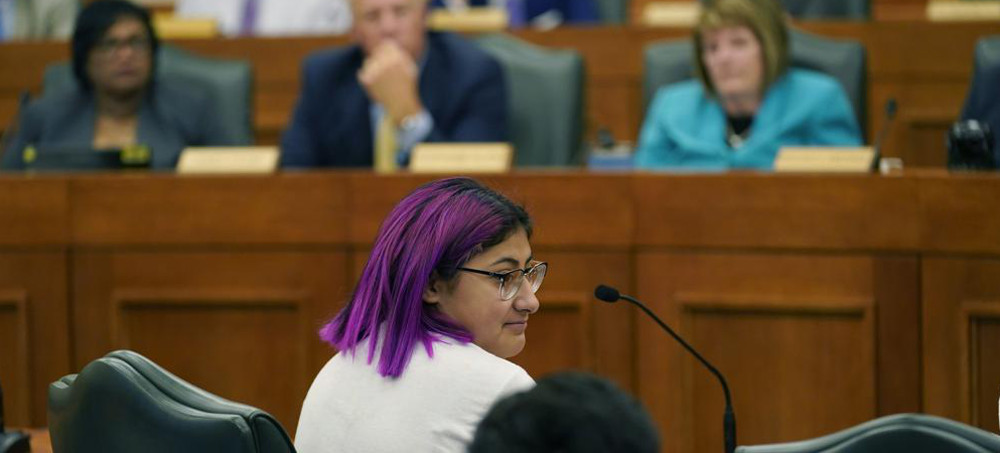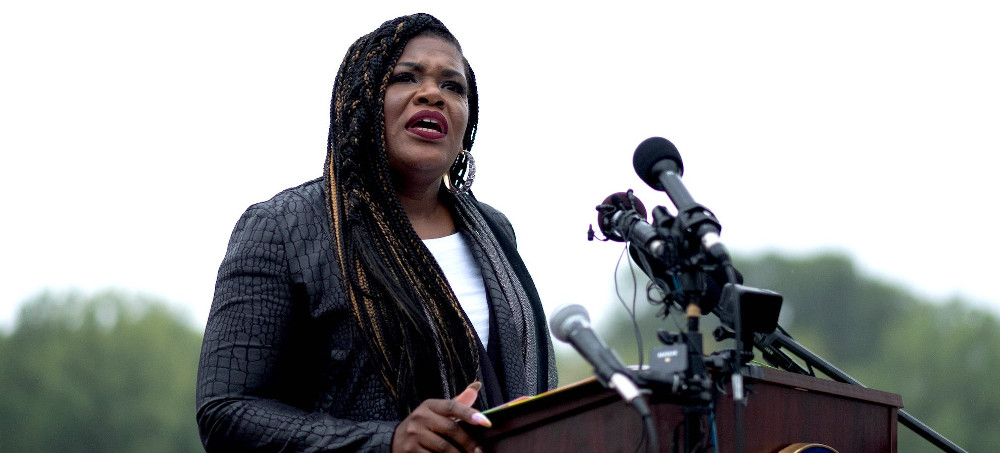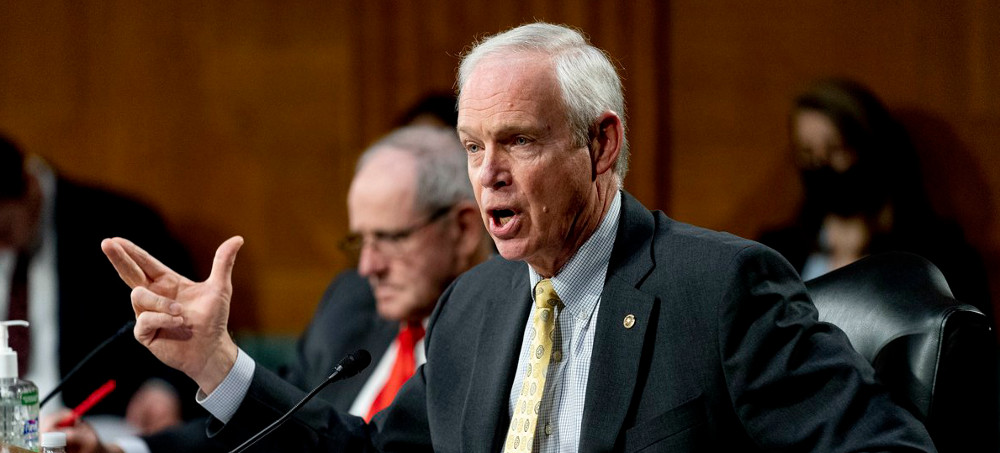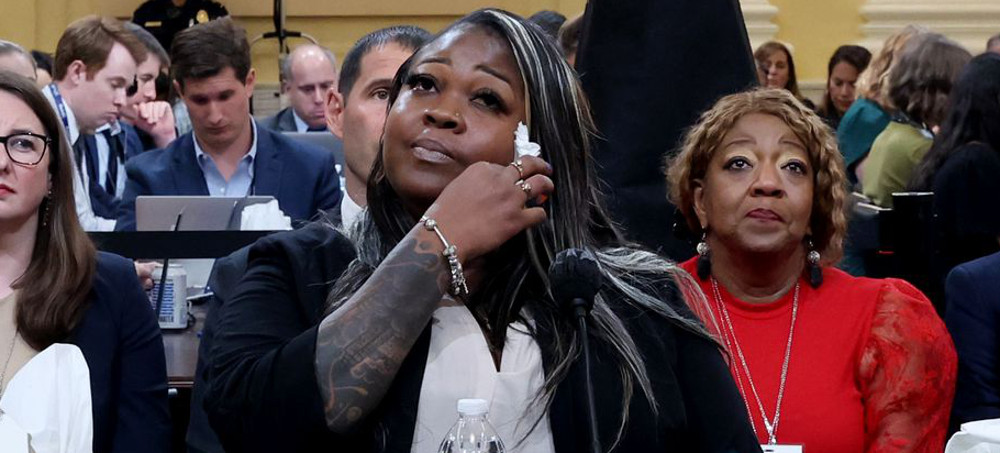Live on the homepage now!
Reader Supported News
Ms. Moss’s mother, Ruby Freeman, was a temp election worker. Giuliani alleged that Moss handed her mother a “thumb drive” at one point. It was a ginger mint, Moss testified Tuesday, according to Deepa Shivaram at NPR.
Giuliani and his boss, Trump, made the lives of Ms. Moss and Ms. Freeman hell for months. Ms. Moss left her job as an election worker, moved out of her house and had to alter her appearance because Rudy Giuliani lied about her and sicced the hounds of the far right on her. “Lady Ruby” Freeman also testified to the ways her life was disrupted.
The Gofundme pages for the two women are here and here.
Giuliani was not always a sick joke. Those too young to have lived through it may have difficulty imagining the atmosphere in the United States after the 9/11 attacks. Grown men would go on late night talk shows, such as David Letterman’s (many years later succeeded now by Stephen Colbert), and break down and cry. Men weeping in public was such a taboo in American politics that it destroyed Ed Muskie’s presidential bid in 1972, but people didn’t complain about it that fall.
Letterman, who doesn’t seem to have had strong partisan politics but who mostly voted Democratic or independent, came back on air September 17, 2001,and praised Giuliani fulsomely. He said one reason he came back on air after the massive tragedy of thousands of lives lost was “Mayor Giuliani” and the firefighters and police. At some point in the aftermath, I remember him saying, “If at any point you don’t know what you need to be doing, all you have to do is look to Mayor Giuliani” or words to that effect. Letterman is a savvy man and from the beginning thought George W. Bush was a “buffoon.” But at that emotional moment, he was taken in by Giuliani and held him up as a model for the nation.
Even that fall, there were reasons to resist the beatification of the man. That fall, Saudi billionaire Alwalid bin Talal wrote a check to the Twin Towers fund for $10 million. He released a statement thereafter urging that the US reexamine its policies on Palestine. Giuliani angrily rejected the check, observing, “One of the reasons I think this happened is because people were engaged in moral equivalency in not understanding the difference between liberal democracies like the United States, like Israel, and terrorist states and those who condone terrorism. So I think not only are those statements wrong, they’re part of the problem,” But Alwalid hadn’t drawn any moral equivalency and had not condoned the attacks, contrary to what Giuliani averred. Al-Qaeda was also trying to kill Saudis like Alwalid. He simply knew that Usama Bin Laden gave as one of the reasons he planned those operations against the US the Israeli treatment of Muslim Palestinians. Nor is the Palestine Authority, which has recognized Israel and cooperates with it on security, a “terrorist state.”
That Giuliani thought Israel, where Apartheid was already well advanced, was a “liberal democracy” says it all. In slapping away Alwalid’s proffered hand, Giuliani was revealing that he was an Islamophobe, a bigot, who would later counsel Trump on how to enact a Muslim visa ban in the U.S.
Then there was Giuliani’s longstanding and creepy relationship with the People’s Jihadis (Mojahedin-e Khalq, MEK), an Iranian expatriate cult long designated a terrorist organization by the State Department (it no longer is), and which ABC alleged received Saudi funding. So much for moral equivalency and the difference between liberal democracy and terrorist organizations.
Then there was his creepy behavior with actress Maria Bakalova when he thought she was a young journalist in hotel room.
So as he went further downhill in the Trump years, throwing the rule of law to the winds, buying into ridiculous conspiracy theories, and sucking up to the monster Trump, Mr. Giuliani may have been revealing who he really was all along. The rumors of racism, even when he was mayor of New York City, and the persistent allegations of corruption, help to make sense of how he subjected Wandrea Shaye Moss and Ruby Freeman to a media lynching and ruined their lives.
 Jazmin Cazares, center, whose young sister Jacklyn was one of 19 children killed at Robb Elementary School, speaks before a hearing at the state capitol, Thursday, June 23, 2022, in Austin, Texas. (photo: Eric Gay/AP)
Jazmin Cazares, center, whose young sister Jacklyn was one of 19 children killed at Robb Elementary School, speaks before a hearing at the state capitol, Thursday, June 23, 2022, in Austin, Texas. (photo: Eric Gay/AP)
ALSO SEE: Supreme Court Says NY Gun Law Is Too Restrictive
“I’m here begging for you guys to do something,” said Jazmin Cazares, whose young sister Jacklyn was one of 19 children shot to death in the 80 minutes the gunman spent inside Robb Elementary School on May 24 before police stormed the classroom and killed him. Two teachers also died in the massacre.
“People who were supposed to keep her safe at school didn’t,” the 17-year-old Cazares said through sniffles. “They failed.”
Her testimony came just as the U.S. Supreme Court announced a decision allowing a major expansion of gun rights, saying Americans have a right to carry firearms in public.
Cazares told a committee of lawmakers looking at how to prevent mass shootings that they could honor the victims by adopting gun background checks and “red flag laws” that allow for the removal of firearms from people at extreme risk of harming themselves or others.
The gunman was a former student, Salvador Ramos, who days after turning 18 bought the AR-15-style semi-automatic rifle he used in the attack.
The Republican-controlled legislature in Texas has stripped away gun restrictions over the past decade even as the state has suffered through a string of mass shootings that killed more than 85 people in the past five years
The state doesn’t require a permit to carry a long rifle like the one used in Uvalde. Last year, lawmakers made it legal for anyone 21 and older to carry a handgun in public without a license, background check or training.
Jacklyn loved singing and dancing and wanted to go to Paris when she graduated, her sister said. “She was one of sweetest souls anybody would ever meet,” Cazares said.
She and her cousin, Annabell Rodriguez, were best friends, part of a close-knit quintet of classmates. All five died in the shooting.
Jacklyn’s big sister told lawmakers that since the massacre she has reviewed the security measures the school was supposed to have in place, including how teachers are told to keep their doors closed and locked at all times.
“How, when some of those classroom doors didn’t lock?” she said, with family members sitting behind her wearing T-shirts with photos of Jacklyn that said “Forever in our hearts.”
Right after Jazmin finished talking about losing her sister, a woman who lost her parents in a 1991 shooting that left two dozen dead at a Luby’s Cafeteria in Killeen, Texas, told the committee that waiting periods for gun sales are “worthless” and gun-free zones should be eliminated.
“Let’s be clear that the gun, it’s just a tool. It’s a tool that can be used to kill a family, but it’s a tool that can be used to protect a family,” said Suzanna Hupp. She said she was invited to address the committee by one of its co-chairs.
Days after the Uvalde tragedy, Jacklyn’s father, Javier Cazares, told of how he rushed to the school and kept a close watch on the children fleeing the school to catch a glimpse of his 9-year-old “firecracker.”
He and other parents grew frustrated that the police weren’t doing more to stop the gunman.
“A lot of us were arguing with the police, ‘You all need to go in there. You all need to do your jobs,’” said Cazares, an Army veteran. “We were ready to go to work and rush in.”
Those delays and mistakes in the law enforcement response are now at the center of federal, state and local investigations. The head of the Texas state police this week called it an “abject failure,” and said how police reacted went against everything learned in the two decades since the Columbine High School shooting in Colorado in 1999.
Officers with rifles stood in a hallway at Robb Elementary for over an hour, waiting in part for more weapons and gear, before going inside the classroom, said Col. Steve McCraw, director of the Texas Department of Public Safety.
He put much of the blame for the delays on Pete Arredondo, the Uvalde school district police chief who McCraw said was the commander in charge.
The school district put the police chief on administrative leave on Wednesday. Uvalde Consolidated Independent School District Superintendent Hal Harrell said the facts of what happened remain unclear and that he didn’t know when details of multiple investigations would be revealed.
Arredondo has said he didn’t consider himself in charge and assumed someone else had taken control. He has declined repeated requests for comment from The Associated Press.
Uvalde’s mayor pushed back against McCraw casting blame on Arredondo, saying the Department of Public Safety has repeatedly put out false information about the shooting and glossed over the role of its own officers.
 PFLAG En Español members celebrate Pride in Los Angeles. (photo: PFLAG)
PFLAG En Español members celebrate Pride in Los Angeles. (photo: PFLAG)
The following year, Manford founded an organization for people like herself – PFLAG, which originally stood for Parents and Friends of Lesbians And Gays.
Over time, PFLAG became a leader in the fight for gay rights. It was a cherished source of support for thousands of families, especially throughout the AIDS epidemic in the 1980s. These days, Pride is a family event and PFLAG serves every member of the LGBTQIA community.
The culture has changed in immeasurable ways, says PFLAG board member Kay Holladay. She remembers how in the early 1980s when her son came out to her, she did not know any gay people.
"I think my choir director at church probably was," she says dryly. Her Southern Baptist church in Norman, Okla. did not accept LGBTQ members. "We had nobody to talk to. We had no other families. We had no resources."
Holladay and her husband felt lost and isolated. They went to the public library to educate themselves but found nothing of use. However, they read about PFLAG in the syndicated advice column Dear Abby and that inspired them to co-found a local chapter. This year, they were grand marshals of Norman's Pride parade.
PFLAG was shaped by people like the Holladays for others like themselves – a largely white demographic who desperately needed support in the days before Ellen DeGeneres and Anderson Cooper helped make the very idea of LGBTQ families mainstream. These days, coming out has become relatively painless for many kids from families like theirs. But it was not easy for Devin Green, a child of immigrants who grew up in Charlotte, N.C.
"It was very nerve-racking," the 19-year-old says of telling his parents he was trans. "Being Jamaican and having a relatively conservative upbringing, I just didn't know what to expect."
Green's family attended a Southern Baptist church that taught a literal interpretation of the Bible. When he came out in ninth grade, Green's mom was less than thrilled. Now, she is open and candid about her family's journey. After all, says Claudette Green, it started for her at home in Jamaica, where she grew up hearing homophobic messages in church, on the news and in popular music.
"There were songs that glorified killing of LGBTQ members," she recalls. "There were actually laws on the books in Jamaica that you could go to jail if you were a member of the LGBTQ community."
After Devin Green persuaded his mom to go to therapy, she was talked into attending a PFLAG meeting. "It was difficult for me because when I got there, I met families who were more accepting of their children and so I felt like a terrible parent," she says. But Green was the opposite of a terrible parent. She and her kid talked. And most importantly, she listened. "Devin was an excellent teacher and I was a very good student," she says.
And when the head of the local PFLAG chapter invited her out for coffee, she went. "She met me where I was," Green says. "Going to PFLAG and seeing the love, it helped me dismantle some of the things I believed."
Five years later, Green proudly marches in Pride parades. She's changed her nursing career to focus on helping LGBTQ youth and she and her husband have supported other Caribbean families adjusting to LGBTQ kids. They've moved to a more affirming church and Green has just accepted a position on PFLAG's Charlotte board.
Still, PFLAG's executive director, Brian Bond, says his organization has a long way to go.
"It's predominantly white," he says. But PFLAG is trying he says, with bilingual literature and developing spaces where people with similar backgrounds and cultural competencies can support each other online. He is haunted, however, by the people PFLAG does not reach.
Bond keeps a receipt in his wallet, he told NPR. It's for the funeral of a 13-year-old trans kid who died by suicide a year and a half ago. His family had never heard of PFLAG. The organization paid for the child's funeral anonymously.
"Interestingly enough, it was a state trooper that reached out to us," Bond says. "And it's not our job, but it's what we needed to do in the moment. And making sure no family has to do that should be our ultimate goal."
Times have changed but in some ways, they haven't. PFLAG has new battles to fight. For the first time, it's become the plaintiff in a lawsuit, against the state of Texas to protect trans kids and their parents fighting for affirmative health care.
 Rep. Cori Bush pushed for the White House to get $100 million in clean energy funding to use through the Defense Production Act. (photo: Tim Evans/Getty)
Rep. Cori Bush pushed for the White House to get $100 million in clean energy funding to use through the Defense Production Act. (photo: Tim Evans/Getty)
Bush’s push would give the White House $100 million in clean energy funding to use through the Defense Production Act.
In the face of a stalled legislative agenda, Biden has turned to the Defense Production Act, invoking it twice this year to boost the production of green energy technology — once in April and again earlier this month. The DPA enables the president to make large adjustments to U.S. manufacturing policy — an authority that House progressives have been calling for Biden to use more aggressively. Senators of both parties, including Joe Manchin, D-W.Va., and Lisa Murkowski, R-Alaska, have also called on Biden to use the DPA to support green technology manufacturing — making passage into law, once the appropriations bill passes the House and is amended in the Senate, more likely.
The new funding would strengthen the effectiveness of Biden’s action and bolster precedent for using executive authority to fight the climate crisis. The text of the provision gives Biden wide latitude in deciding how exactly to use the funds in support of those technologies, as is standard for policy created through the DPA.
The measure’s inclusion was the result of a last-minute, behind-the-scenes effort by Bush, whose office has regularly led efforts for bold climate legislation. In a statement provided to The Intercept, Bush praised the inclusion of the funding. “The DPA is one of the most important tools we have to take on high gas prices and the climate crisis at the same time,” she said. “To protect all of our communities, particularly those with the greatest need, we must take robust measures to transition to renewable energy and lower prices as quickly as possible. This funding helps us achieve that.”
Progressives in Congress have called on Biden to use his broad executive authority to make headway on a suite of Democratic priorities. In March, the Congressional Progressive Caucus pushed Biden to invoke the DPA as part of an aggressive administrative response to the climate crisis. Bush also introduced similar legislation with Sen. Bernie Sanders, I-Vt., and Rep. Jason Crow, D-Colo., to bolster the Defense Production Act earlier this year.
But while House leadership and the White House have been broadly supportive of the provision, Biden’s latest invocation of the DPA left members of the House Appropriations Committee with little time to account for the new policy in ongoing negotiations. After individual Appropriations subcommittees receive their top-line figures, which in this case roughly coincided with Biden’s announcement at the beginning of June, it is difficult to secure funding for new priorities. By coordinating discussions among the White House, House Speaker Nancy Pelosi’s office, and Rep. Marcy Kaptur, D-Ohio, chair of the House Appropriations Subcommittee on Energy and Water Development, Bush — a first-term representative — exerted a rare amount of influence over a process that is usually guided by senior members of the caucus.
In a press release marking the subcommittee’s release of the draft bill, Kaptur touted the inclusion of the DPA funding, indicating that Bush’s efforts have significant buy-in from key players in the appropriations process. “From unleashing energy innovation and utilizing the Defense Production Act to boost domestic manufacturing, to responsibly managing water resources and tackling the crisis of climate change – this Energy and Water bill delivers for America’s needs in the 21st century,” Kaptur said.
If the new funding survives ongoing negotiations, it may embolden progressives to demand more executive action from the administration. Legislation that endorses Biden’s use of the DPA to support green energy technology would provide the administration with a layer of insulation from legal challenges over the issue going forward. If Democrats lose one or both chambers of Congress in November, that precedent could be key to ensuring that the administration has tools to continue fighting the climate crisis.
 Sen. Ron Johnson, R-WI, speaks on Capitol Hill in Washington, Feb. 8, 2022. (photo: Andrew Harnik/AP)
Sen. Ron Johnson, R-WI, speaks on Capitol Hill in Washington, Feb. 8, 2022. (photo: Andrew Harnik/AP)
This week, the House committee investigating the Jan. 6 Capitol riot revealed that Johnson’s chief of staff tried to deliver to Vice President Mike Pence a slate of fake electors backing Trump, raising questions about the Wisconsin Republican’s role in a deliberate and coordinated plan to block Biden’s win and give Trump the presidency.
The disclosure also underscores the extent of Johnson’s role as one of Congress’s most prominent election deniers and Jan. 6 apologists — spreading conspiracy theories about rigged votes and playing down the severity of the violent assault on the Capitol as mostly “peaceful,” while floating the idea that it might have been an inside job by the FBI.
Johnson, who is up for reelection this year, has been dogged by scandals and controversial statements since aligning himself with Trump. He has spread false information about the coronavirus, was accused of racism for saying he would have been concerned had Black Lives Matter protesters flooded the Capitol on Jan. 6 instead of mostly White Trump supporters, and is under fire for using taxpayer funds for airfare between Washington and his Florida home. Some Democrats and political experts say this latest revelation of direct communication in the form of text messages between Johnson and Pence staff on Jan. 6 could sway voters in a battleground state where elections are won by a slim margin.
“What happened in the last 24 hours is different. It’s one thing to articulate off-the-wall political positions, it’s another thing to possibly have assisted in a coup attempt,” said Kenneth R. Mayer, a political science professor at the University of Wisconsin at Madison.
Johnson’s possible Democratic opponents — the Wisconsin primary is in August — immediately attacked him, arguing that the texts provide tangible evidence to voters that Johnson was part of an attempt to nullify the votes of thousands of Wisconsinites. A poll released Wednesday by Marquette Law School but conducted before the latest revelations found Johnson trailing three of his four potential opponents by single digits.
Senate Democratic candidate Tom Nelson, who previously had pushed for the Jan. 6 committee to subpoena Johnson, on Wednesday called on the senator to resign. “Today’s revelations go beyond anything I could have imagined for how far Ron Johnson would go to overturn our Wisconsin election result. Johnson should not only resign and be placed under oath, but all signs point to evidence of a crime that the U.S. Department of Justice is obligated to investigate.”
Wisconsin Lt. Gov. Mandela Barnes, who is also running in the Democratic Senate primary, called on Johnson to “resign immediately.”
“Ron Johnson actively tried to undermine this democracy. He literally tried to hand Mike Pence fake ballots. Once again, Ron Johnson has proven he’s a danger to our country and our fundamental rights,” Barnes said in a statement.
“Ron Johnson is a seditious traitor and a danger to democracy,” tweeted Alex Lasry, another Senate candidate.
Sarah Godlewski, Wisconsin state treasurer and another Democrat vying to challenge Johnson, called him “a threat to our democracy and a disgrace to our state.”
Johnson spokeswoman Alexa Henning dismissed the criticism. “The senator’s Democrat opponents are always trying new ways to avoid talking about their disastrous Democrat policies,” she said. “The senator has never considered resigning as a result of dozens of false attacks already made against him. Why would this absurd attack be any different?”
Henning did not respond to specific questions about the text messages or Johnson’s knowledge of the fake electoral documents.
Johnson has denied his involvement in the plan to deliver to Pence fake Trump electors. A text message shown at the hearing, from Johnson chief of staff Sean Riley to Pence aide Chris Hodgson and sent minutes before the joint session of Congress to certify the Biden win, said “Johnson needs to hand something to VPOTUS please advise.”
“What is it?” Hodgson replies. “Alternate slate of electors for MI and WI because archivist didn’t receive them,” Riley writes. “Do not give that to him,” Hodgson responds.
Johnson told reporters on Tuesday that someone from the House side, “some staff intern,” brought the envelope to his office and said it needed to be delivered to the vice president. Johnson claims that his office attempted to make the handoff, but the vice president’s staff rejected it and that was his staff’s total involvement. “I had no hand in it,” Johnson said. “This is a total non-story.”
Johnson acknowledged that “he was aware that we got something delivered that wanted to be delivered to the vice president,” but said he did not know who delivered it or what it was. He said his chief of staff “did the right thing” in offering the documents to the vice president.
Later, Johnson left the Capitol trailed by reporters asking him about the text messages. Johnson held his phone to his ear and said he was on a call, but a reporter challenged the senator, saying that he could see the screen and knew Johnson wasn’t talking to anyone.
“The bottom line is that Johnson is not stupid — he had to know what the context of the moment was, what was happening on Jan. 6, what was going on back home; he was far down the rabbit hole of ‘Stop the Steal’ efforts,” said Charlie Sykes, a prominent former Republican who has long opposed Trump. Sykes, who lives in Wisconsin, said “the very specific, easily understandable” image of the text messages from Johnson’s staff to the vice president’s office referencing alternate electors takes the effort to overturn the election from an abstract notion to something tangible.
The Jan. 6 committee unpacked a few other details about how the Wisconsin plan came together. Andrew Hitt, a former Wisconsin GOP chairman, signed on to be a fake elector for Trump. In testimony to the committee, Hitt said he thought the Trump slate of alternate electors would only be used if the Trump campaign won its legal challenges.
“I was told that these would only count if a court ruled in our favor,” he said. Otherwise, “It would have been using our electors in ways that we weren’t told about and we wouldn’t have supported,” Hitt said in a clip shown during the hearing.
A package tracker shows that the packet of certificates was mailed in Wisconsin on Dec. 16 but was not accepted by an employee at the National Archives in Washington until the morning of Jan. 4. Later that day, Mark Jefferson, the executive director of the Wisconsin Republicans, texted someone: “Freaking trump idiots want someone to fly original elector papers to the senate President. They’re gonna call one of us to tell us just what the hell is going on.”
Hitt and Jefferson did not respond to requests for comment.
Jeffrey Mandell, a Wisconsin attorney on a lawsuit filed in May against the fake Trump electors in the state, said there remain many holes in the timeline, including who from the Trump campaign was in contact with Hitt and Jefferson and who gave the fraudulent documents to Johnson’s office. Mandell pointed out that the cover page included with the alternate slate of electors sent to Washington was on official Republican Party of Wisconsin letterhead.
Mandell said that while many questions remain, the committee’s implication of Johnson is confirmation of the senator’s role in trying to overturn the 2020 election.
“We’ve known for a long time that he was an adherent of the ‘big lie’ and was willing to say and do anything to advance that ‘big lie,’ ” Mandell said. “He has continued to waffle and for the most part has continued to entertain the ‘big lie’ and support those conspiracy theorists. It wasn’t a terrible surprise, but there is something pretty visceral about the image of Senator Johnson physically trying to get these papers to Pence in the light of day, on the Senate floor, at the key moment right before Congress started to count the votes.”
 Workers in a garment shop in Haiti. (photo: Richard Perry/The New York Times)
Workers in a garment shop in Haiti. (photo: Richard Perry/The New York Times)
Women paid a pittance for making clothes for top US brands are often forced to have sex by bosses to keep their jobs, say unions
The 24-year-old says she had little choice. She relies on her job to support her four-year-old son after both her father and husband died.
“He made a lot of promises. He told me he was going to help me financially with my son’s school and was also going to help me pay my rent with a promotion, so I did it,” she says. “Afterwards, he told other security officers and every time I came to the factory, I felt humiliated and diminished. I never got a salary increase and never got any financial support.”
The head of security was not the only man at the factory to notice Marie. In March, her line supervisor began sexually harassing her, telling her he masturbated when he thought of her at home. She felt powerless to report him, knowing what happened to other women who complained. So to keep her job, she kept silent. But his behaviour got worse.
“He told me that if I didn’t agree to sex with him, he was going to pull me out of the line where we assemble clothes,” she says. She refused and in retaliation every time she went to the toilet she found piles of clothing added to her workstation, making it impossible to complete her work for the day. After weeks of harassment, she finally snapped when he began touching her inappropriately.
“I told him to leave me alone, and because of that I was suspended for three days,” she says. “Even now, he is harassing me. He still wants to have sex.”
Yet Marie says that what is happening to her is standard practice at her factory and that other women are also afraid to speak out, scared of what might happen after they tell their story.
In recent years, Haiti, the poorest country in the western hemisphere, has promoted itself as a cheap and available destination for US clothing brands seeking low-cost suppliers that can take advantage of 2006 legislation that allows duty-free entry for goods made there by US companies.
About 60,000 Haitians work in one of the country’s 41 garment factories, producing clothes for more than 60 American companies.
Yet activists say conditions at the factories are akin to prison camps, with non-existent labour rights and where sexual abuse is rife.
“Workers are not considered as humans or as needing rights,” says Yannick Etienne, of the workers’ rights organisation Batay Ouvriye. “The pay is so low that it puts women in situations where they have to accept [forced] sex in order to pay their rent.”
The government has not raised the minimum wage since 2019, despite inflation of more than 15%. The country is experiencing catastrophic levels of insecurity and political instability after the assassination of President Jovenel Moïse last year. As a result, food and fuel prices have escalated. Unions are fighting for an increase in the minimum daily wage of garment workers from 500 to 1,500 gourdes ($5-15).
Female garment factory workers the Guardian spoke to confirm that to get a job – which has become harder because so many people are looking for work – women are expected to have sex with a male manager.
“If you don’t accept to have sex with the manager, your application will be rejected,” one worker says, adding that she works on a line that produces 3,600 T-shirts a day. “You must oblige or you won’t have a job, and also if you want a promotion, you must have sex with your supervisor.”
Workers interviewed by the Guardian also spoke of having to use scrap material as sanitary towels because they could not afford to buy their own.
Rose-Myrtha Louis, a coordinator at the Haitian Workers’ Renovation Syndicate, said: “We are supposed to have access to pads, but we have to use waste from T-shirts [because] we don’t have enough money. It has given us infections. It’s just another way we are suffering.”
A 2021 report from Better Work Haiti, a labour compliance group backed by the International Labour Organization and the World Bank, found that 80% of workers and their families have had to cut down on meals. It also found that 96% of factories surveyed failed to comply with Haiti’s health insurance and social security contribution requirements, putting workers’ lives at risk.
“When you consider the price that the clothes are sold for, and the wages we receive, it’s as if we are selling our blood,” Marie says.
The Haitian Ministry of Trade and Industry did not reply when asked for comment.
 Titanium dioxide is used as a whitener in an array of food - candies and pastries to cheese and gum. (photo: Jozef Polc/Alamy)
Titanium dioxide is used as a whitener in an array of food - candies and pastries to cheese and gum. (photo: Jozef Polc/Alamy)
The EU is banning food whitener titanium dioxide. It is the latest example of a chemical deemed unsafe in Europe that’s still used in the US
The additive, also known as E171, joins a host of other chemicals that are banned in foods in the European Union but allowed in the US.
These include Azodicarbonamide, a whitening agent found in food such as breads, bagels, pizza, and pastries in the US, which has been banned in the EU for more than a decade. Known as the “yoga mat’’ chemical because it is often found in foamed plastic, the additive has been linked to asthma and respiratory issues in exposed workers and, when baked, to cancer in mice studies.
Potassium bromate, an oxidizing agent often found in bread and dough and linked in animal studies to kidney and thyroid cancers, has been banned in the EU since 1990 but is still commonly used in the US. Brominated vegetable oil is also banned in the EU but is used as an emulsifier in citrus sodas and drinks in the US. Long-term exposure has been linked to headaches, memory loss and impaired coordination.
The Food and Drug Administration classifies these food chemicals, and many others prohibited by the EU, as “generally recognized as safe”.
Chemical safety processes in the EU and US work in starkly different ways. Where European policy tends to take a precautionary approach – trying to prevent harm before it happens – the US is usually more reactive.
There is more of a “wait and see approach”, said Tatiana Santos, chemicals manager at the European Environmental Bureau (EEB), a network of environmental citizens’ organizations. “The US often waits until the harm is done and the EU tries to prevent it to a certain extent. It often seems the US favors the market over protection.”
The EU’s decision to phase out titanium dioxide came after a re-evaluation of the safety of the food additive conducted by the European Food Safety Association (EFSA), an agency that delivers independent scientific advice to the EU about food-related risks.
EFSA scientists screened nearly 12,000 scientific publications. They were particularly interested in recent research on the “genotoxicity” of titanium dioxide nanoparticles – their ability to damage DNA and lead to cell mutations, potentially causing cancer. In animal studies, nanoparticles have been found to affect microorganisms in the gut, which could trigger diseases like intestinal and bowel inflammation and colorectal cancer.
EFSA’s expert panel on food additives and flavorings found it could not rule out concerns about the genotoxicity of the nanoparticles, which accumulate in the body over time, meaning it could “no longer be considered safe as a food additive”.
Unlike the EU, the US does not have agencies like EFSA that offer independent scientific evaluation of new chemicals brought to the market. And while the EU has consistently updated its methods and processes for evaluating new chemicals, some experts say the US system, set up more than half a century ago, needs updating.
EFSA, funded by the EU, was created in 2002 to determine existing and emerging risks in the food chain. European manufacturers interested in using new chemicals must undergo EFSA’s scientific evaluation, which analyzes manufacturing process, proposed uses and toxicity to humans, among other factors. EFSA then provides scientific advice to the European Commission, member state authorities and the European parliament.
While there have been previous criticisms about conflicts of interest, an EFSA spokesperson said the body had “a strict set of internal mechanisms and working processes to safeguard the independence of our science”.
In the US, the Food Additive Amendment was created in 1958, after public concern about the safety of food chemicals. All new food chemicals were required to be evaluated and approved by the FDA, although chemicals already in the food system before the amendment were not re-evaluated.
In the case of additives like titanium dioxide, manufacturers petition the FDA for its approval by submitting evidence that the substance is safe for its intended use. The FDA evaluates the application, and will authorize the additive if it concludes the data provided demonstrates that the substance is safe to use.
This is “a clear conflict of interest”, said Thomas Galligan, principal scientist for food additives and supplements at the non-profit watchdog and consumer advocacy group Center for Science in the Public Interest. “Of course [companies] are going to want to say it’s safe.”
An FDA spokesperson said that in addition to evidence from the manufacturer, the organization will do its “own review of the literature and other relevant information”.
Alongside the lack of independent evaluation, the guidance on how to conduct these food safety assessments has not been updated at the FDA since 2007.
“So even when these chemicals are being evaluated, they’re not using modern science in those evaluations, whereas the EU updates their guidance pretty regularly,” said Galligan. “There’s been a lot of research in toxicology in the last 15 years that isn’t necessarily being implemented by the FDA.”
Galligan said this includes a better understanding of how different chemicals interact and how exposure to multiple chemicals may have a more significant impact on someone’s health than being exposed to each one alone.
Most serious diseases like cancer are multifactorial, said EEB’s Santos. “You can get cancer for many different reasons and one of them is exposure to carcinogens. We are exposed to hundreds of chemicals on a daily basis. It’s so difficult to prove in hindsight, though, that a certain chemical is the reason for causing, say, cancer, and that’s why a precautionary principle should be used.”
An FDA spokesperson said the organization’s “evaluation of the safety of food additives and color additives is based on the most current science available at the time, and this includes information made public by other regulatory bodies.”
It says titanium dioxide is safe on current evidence. “The available safety studies do not demonstrate safety concerns connected to the use of titanium dioxide as a color additive,” said the FDA spokesperson.
The American Chemistry Council (ACC), an industry body representing US chemical companies, said in a statement: “The EFSA assessment did not conclude that E171 is genotoxic but identified uncertainties with a need to further investigate the effects of the substance.” The association added that the industry “is investing in new science to generate data to confirm the safety of E171”.
The titanium dioxide global market was valued at $17.19bn in 2020 and is projected to grow more than 6% over the next five years.
The EU’s phase-out of titanium dioxide comes in the midst of chemical overhaul. Up to 12,000 chemicals found in food packaging, cleaning supplies, cosmetics, children’s products, pesticides and more will be banned over the next five years. The bloc is promising to outlaw chemicals linked to cancers and endocrine disorders in an effort dubbed the “great detox”.
As the EU continues its sweep of chemical regulation, some hope the FDA will be pushed to do the same. “If the worry is that these regulations will damage the market, look at Europe,” said Santos. “It banned or regulated thousands of chemicals in the market and we’re still among the most competitive in the world.”
Santos also noted that research has shown strong legislation can actually spur innovation, “pushing companies to innovate when chemicals may be banned”. She said: “Why not design chemicals that are safe in the first place, so that they won’t need to be potentially banned in the future?”
Special Coverage: Ukraine, A Historic Resistance
READ MORE
Follow us on facebook and twitter!
PO Box 2043 / Citrus Heights, CA 95611



No comments:
Post a Comment
Note: Only a member of this blog may post a comment.